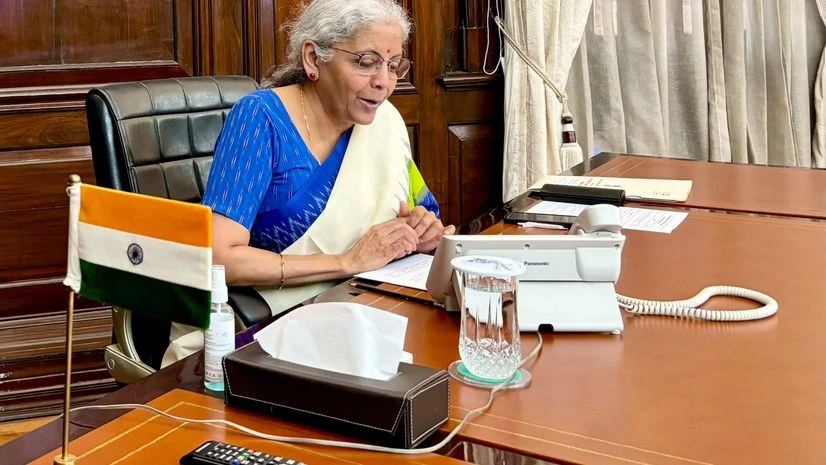The next fortnight will be a volatile phase for the Indian stock markets as they prepare and then digest finance minister Nirmala Sitharaman’s budget proposals for fiscal 2024-25 (FY25).
June quarter corporate earnings season (Q1-FY25), too, analysts suggest, is likely to see stock specific moves and have some bearing on the overall market sentiment.
That said, analysts say that the budget’s influence on the market performance from a medium-to-long term perspective is declining.
Expectations (as measured by pre-budget equity market performance), wrote analysts at Morgan Stanley in a note, are important in determining what the market does immediately after the budget. The market, they said, falls on two of three occasions in the 30 days post the budget.
Also Read
“The probability of such a fall rises to 80 per cent if the market has risen in the 30 days preceding the budget. Only twice in 30 years has the market been up both pre and post the budget. This year, India is tracking higher on both an absolute and relative basis and if it were to hold this performance into the budget day, then there is a strong likelihood that it corrects post budget,” wrote analysts at Morgan Stanley, led by Ridham Desai, their head of India research and India equity strategist, in a report co-authored with Sheela Rathi and Nayant Parekh.
Market performance around budget
Here is what leading brokerages expect from Nirmala Sitharaman's Modi 3.0 budget scheduled to be announced on July 23.
BofA Securities
Expect tax cuts to boost consumption, higher subsidy, especially for rural housing, expansion of scope of PLI, special assistance to states and additional healthcare coverage. Our underlying assumption is 11 per cent nominal GDP growth rate for FY25.
The Centre may raise the income threshold for zero tax from Rs 3-lakh to Rs 5-lakh in the upcoming budget. Consideration to lower income tax rates for individuals earning annual income of Rs 10-lakh is also underway. Given that the government is trying to encourage the taxpayers to adopt the Simplified Tax Regime, a change in the 80C is likely. There is also a growing demand for the expansion of the HRA exemption to include more non-metro cities.
The upcoming budget could propose changes in the tax treatment of income from futures and options (F&O) segments with an aim to discourage retail participation in the derivatives trading.
Morgan Stanley
Expect the fiscal deficit target to be retained at 5.1 per cent of GDP in FY25, in line with the interim budget. Job creation supported through capex, targeted social sector spending and focus on 'Viksit Bharat' plan are likely to be the key themes. The budget could also give a road-map for a medium-term plan for fiscal consolidation beyond FY26.
We do not assume a reduction in personal income tax rates (base case); however, there are expectations that the government could use some of the fiscal space to provide tax relief to middle income taxpayers.
Watch out for announcements affecting agriculture, start-ups, housing, railways, defense, lab-grown diamonds, electronics, semiconductors, aerospace, electric vehicles, textiles, food processing and renewables. We also need to see the amount of spend directed at Andhra Pradesh and Bihar, if any, two states from where two key allies of this government come from.
Short-term capital gains (STCG) tax rate could be raised from 15 per cent. A hike in the effective long-term capital gains (LTCG) tax on equities either via lengthening of the holding period from 12 months to two or three years to qualify for long-term capital, or an increase in the tax rate from 10 per cent to 15 per cent could be a major dampener for stocks, especially in the broad market. Neither the market nor we expect this.
Goldman Sachs
Budget will go beyond just fiscal numbers, and likely make an overarching statement about long-term economic policy of the government towards 2047. Thrust on rural economy, job creation through labor-intensive manufacturing, support for MSMEs, skilling and high quality services jobs. A reduced political mandate will require more political capital to be spent behind passing structural reforms like land reform and farm sector reforms.
Nomura
We do not expect a pivot to populism. Instead, a continued focus on capex and fiscal consolidation is likely. That said, the election outcome is unlikely to result in much of a negative impact on the macro outlook/policy.
Motilal Oswal Securities
While tax estimates may not change, record-high RBI dividends could help the government to spend an additional amount of about Rs 1.1 trillion this year, while reducing the fiscal deficit target to 5 per cent of GDP in FY25.

)